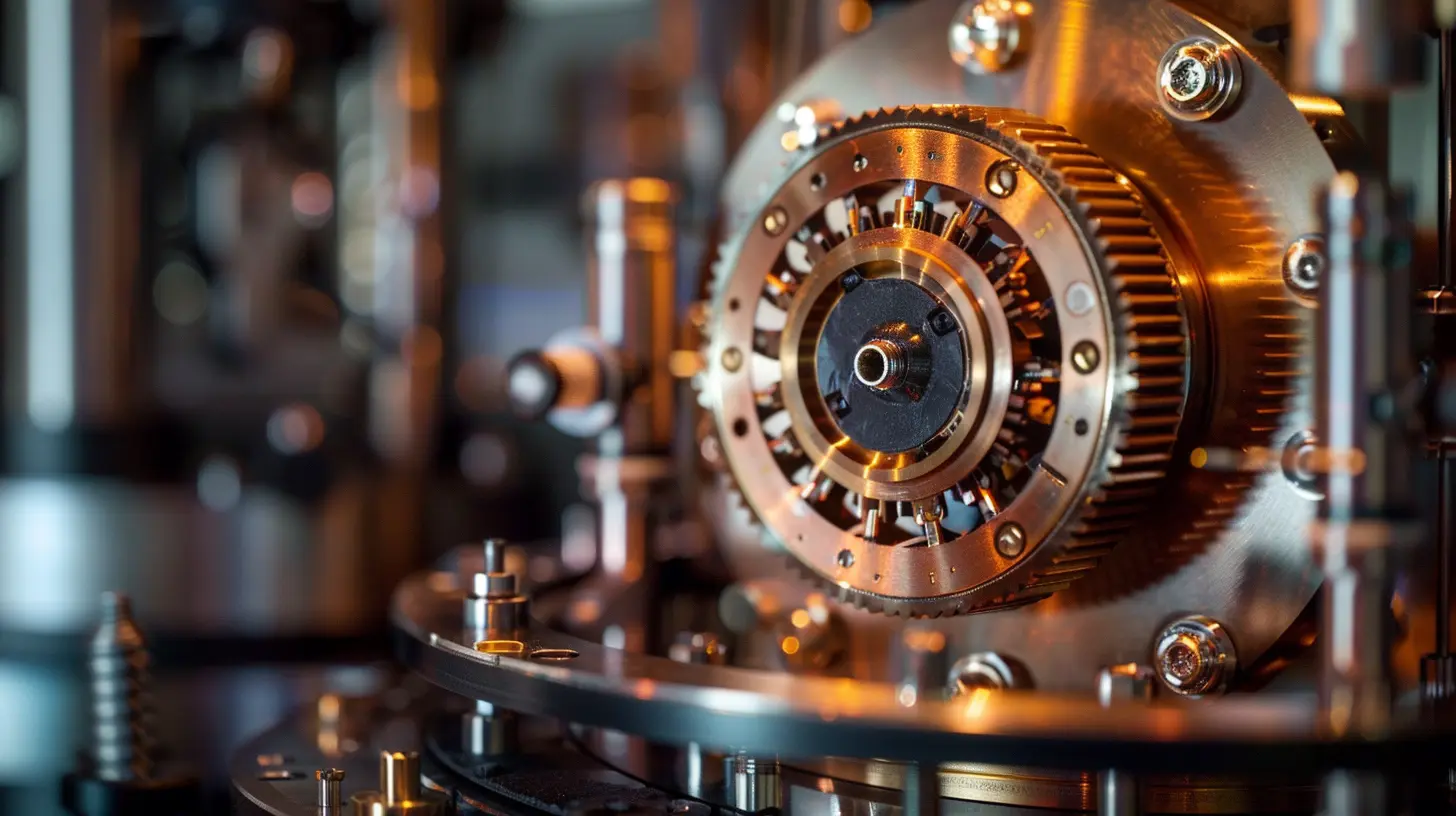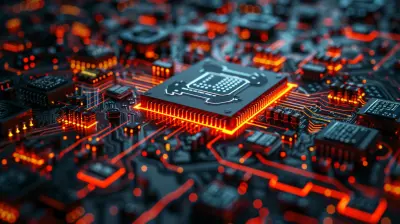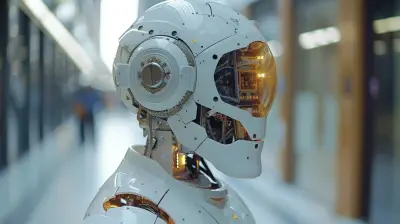3 January 2025
Quantum computing is one of those futuristic technologies that almost feels like science fiction, doesn’t it? I mean, we hear about it in passing, but very few of us have a concrete understanding of how it works, let alone its impact on other fields. But here’s the thing—quantum computing is real, and it's set to revolutionize areas like artificial intelligence (AI) and machine learning (ML). In fact, it already is. So, grab your favorite gadget (maybe your laptop or tablet), and let's break down how quantum computing is shaking up the world of machine learning.

Machine Learning: A Quick Refresher
Before we dive into the quantum side of things, let’s take a quick pit stop and refresh our understanding of machine learning. You may already know this, but machine learning is a subset of AI where algorithms learn from data and make decisions based on patterns. Think of it like teaching a toddler how to recognize different animals. After showing them pictures of dogs, cats, and birds, they eventually figure out which is which without you having to explain each time.Now, while machine learning has made great strides—powering everything from Netflix recommendations to self-driving cars—it's still limited by the classical computing power available today. And that’s where quantum computing enters the scene.

What is Quantum Computing?
Alright, time to put on our thinking caps. Quantum computing is fundamentally different from classical computing. Whereas classical computers use bits (which can be either 0 or 1), quantum computers use qubits. What’s the big deal about qubits, you ask? Well, qubits can exist in multiple states at once thanks to a mind-boggling property called superposition. Imagine flipping a coin. A classical computer would see the coin as either heads or tails. A quantum computer, on the other hand, could see it as both heads and tails at the same time!This ability gives quantum computers the potential to perform complex computations at speeds that would take classical computers thousands, if not millions, of years to achieve. But don’t get too excited just yet—quantum computers are still in their infancy, and we’re far from seeing them in everyday gadgets.
Still, their potential is impossible to ignore, especially when it comes to machine learning.

How Quantum Computing Enhances Machine Learning
So, why is quantum computing such a game-changer for machine learning? The answer lies in the inherent limitations of classical computing. Machine learning algorithms, particularly the ones used for tasks like image recognition or natural language processing, require immense amounts of computational power. As data sizes grow exponentially, classical computers are struggling to keep up.Quantum computing, with its ability to process many calculations simultaneously, can dramatically speed up machine learning tasks. Here are a few key areas where quantum computing could revolutionize machine learning:
1. Accelerated Data Processing
Today's machine learning models often require massive datasets to learn effectively. The more data, the better the model—at least in theory. However, processing these vast datasets can take a ridiculous amount of time.Quantum computing, with its parallel processing capabilities, can sift through massive amounts of data in the blink of an eye. This could significantly reduce the time it takes to train machine learning models, allowing researchers and engineers to iterate faster and improve models in real-time.
2. Solving Optimization Problems
Optimization problems are everywhere in machine learning. For instance, let’s say you're building a neural network and you need to find the best configuration of weights and biases to minimize error. This is an optimization problem, and it’s not easy to solve, especially as the number of variables increases.Quantum computers excel at solving these kinds of problems. They can explore multiple possible solutions at once, thanks to superposition and another quantum property called entanglement. That means quantum computers can find the optimal solution much faster than classical computers, which have to check one solution at a time.
3. Improving Accuracy in Model Predictions
Machine learning models, no matter how well-tuned, always come with some level of uncertainty. After all, they’re based on probabilities, and they don’t always make perfect predictions.Quantum algorithms—especially those designed for machine learning—have the potential to provide more accurate models by reducing uncertainty. Quantum computers can handle complex probability distributions and make predictions with greater precision than classical models. For example, Google’s Quantum AI team has already made breakthroughs in using quantum computers for more accurate weather forecasting.
4. Enhanced Feature Selection
Machine learning models rely heavily on feature selection—choosing the right input variables to train the model. But in many cases, datasets have hundreds or even thousands of features, and selecting the most relevant ones can be a daunting task.Quantum computers can dramatically improve feature selection by processing many features simultaneously and identifying the most important ones faster than classical methods could ever hope to. This means better-performing models and less time wasted on irrelevant data.
5. Quantum Neural Networks
Here’s where things get really exciting: quantum computing could give rise to an entirely new class of machine learning models—quantum neural networks (QNNs). In classical AI, neural networks are modeled after the human brain, with layers of neurons that process information. A quantum neural network could take this to the next level by leveraging quantum mechanics to unlock new patterns and relationships in data that classical networks simply can’t detect.While QNNs are still largely theoretical, they could one day become the foundation for a new era of AI, one where machines can "think" in ways that are much closer to human intuition.

Real-World Applications: Where Quantum Computing and Machine Learning Collide
So, how will all this quantum computing magic actually play out in the real world? While we’re still in the early stages, companies and researchers are already exploring some fascinating applications:1. Drug Discovery
The pharmaceutical industry is drowning in data. From understanding disease mechanisms to predicting how different compounds will interact with the body, it’s an area ripe for quantum computing. By speeding up simulations and processing vast amounts of biological data, quantum-powered machine learning could help researchers discover new drugs faster and more accurately than ever before.2. Financial Modeling
Quantum computing can be a game-changer in the world of finance. Machine learning models are already used to predict stock prices, manage risk, and detect fraud. With quantum-enhanced machine learning, these models could process market data at unprecedented speeds and find patterns that classical computers simply miss. This could lead to better investment strategies, more accurate predictions, and even more secure financial systems.3. Climate Modeling
As we mentioned earlier, quantum computing can supercharge machine learning models used for weather and climate predictions. Considering the growing urgency of climate change, having more accurate models could help us better understand and predict the environmental changes we’re facing, leading to smarter conservation and sustainability strategies.4. Autonomous Vehicles
Quantum computing could also play a role in the development of self-driving cars. Machine learning is already the backbone of autonomous vehicle systems, but with quantum computing, these systems could process vast amounts of sensor data in real-time, allowing vehicles to make faster and more accurate decisions. This could lead to safer, more efficient autonomous driving systems.The Challenges: It’s Not All Smooth Sailing
As with any emerging technology, there are significant challenges. Quantum computers are still in the early development stages, and building stable qubits is no easy feat. The technology is prone to errors due to quantum noise, and scaling these systems to a point where they can outperform classical computers in everyday tasks is still a work in progress.Moreover, integrating quantum computing with existing machine learning frameworks will take time and effort. Most machine learning models today are built for classical systems, and adapting them to work with quantum computers will require new algorithms, new software, and even new ways of thinking about data.
The Future of Quantum Computing and Machine Learning
While we’re not quite there yet, the future of quantum computing and machine learning is incredibly promising. Imagine a world where AI systems can process data so quickly and accurately that they can solve problems we didn’t even know existed. That’s the kind of future quantum computing could help create.In the coming years, we can expect to see more collaboration between quantum computing and machine learning researchers. Companies like IBM, Google, and Microsoft are pouring resources into quantum research, and as the technology matures, we’ll likely see more real-world applications that change the way we interact with technology.
Conclusion
Quantum computing and machine learning are two of the most exciting fields in tech today. While they may seem like separate worlds, the intersection of these two technologies could unlock unprecedented opportunities. From faster data processing and better model predictions to entirely new types of neural networks, the impact of quantum computing on machine learning is set to be nothing short of revolutionary.We’re still in the early days, but the next decade could see quantum-powered machine learning models solving some of the world’s most complex problems—from healthcare to climate change to finance. So, keep your eyes on this space because the quantum revolution is just getting started.













Winona Soto
Exciting times ahead for tech with quantum breakthroughs!
April 6, 2025 at 4:52 AM